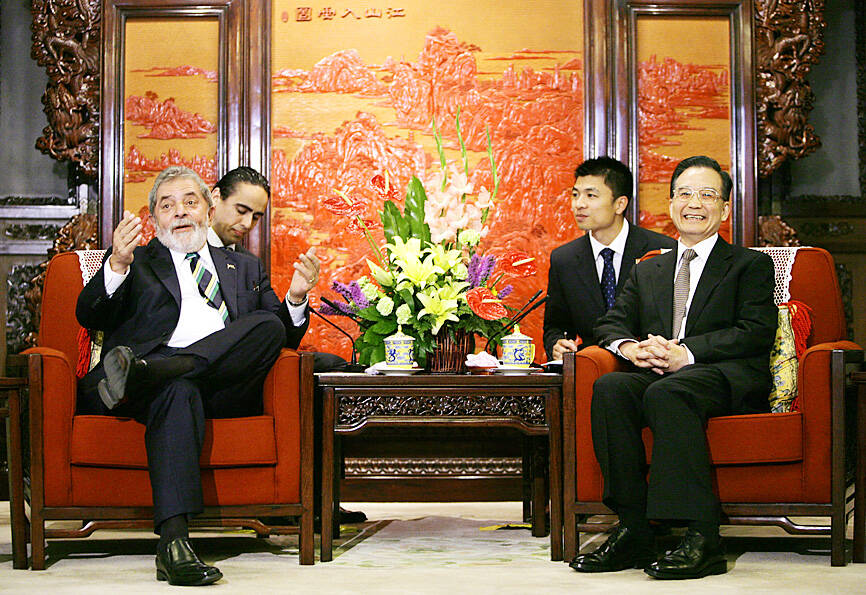China and Brazil have reached a deal to trade in their own currencies, ditching the US dollar as an intermediary, the Brazilian government said on Wednesday, Beijing’s latest salvo against the greenback.
The deal would enable China, the top rival to US economic hegemony, and Brazil, the biggest economy in Latin America, to conduct their massive trade and financial transactions directly, exchanging yuan for reals and vice versa instead of going through the US dollar.
“The expectation is that this will reduce costs ... promote even greater bilateral trade and facilitate investment,” the Brazilian Trade and Investment Promotion Agency said in a statement.

Photo: AFP
China is Brazil’s biggest trading partner, with a record US$150.5 billion in bilateral trade last year.
The deal, which follows a preliminary agreement in January, was announced after a high-level China-Brazil business forum in Beijing.
Brazilian President Luiz Inacio Lula da Silva was originally scheduled to attend the forum as part of a high-profile China visit, but had to postpone his trip indefinitely on Sunday after he came down with pneumonia.
The Industrial and Commercial Bank of China and Bank of Communications BBM are to execute the transactions, officials said.
China has similar currency deals with Russia, Pakistan and several other countries.

‘EYE FOR AN EYE’: Two of the men were shot by a male relative of the victims, whose families turned down the opportunity to offer them amnesty, the Supreme Court said Four men were yesterday publicly executed in Afghanistan, the Supreme Court said, the highest number of executions to be carried out in one day since the Taliban’s return to power. The executions in three separate provinces brought to 10 the number of men publicly put to death since 2021, according to an Agence France-Presse tally. Public executions were common during the Taliban’s first rule from 1996 to 2001, with most of them carried out publicly in sports stadiums. Two men were shot around six or seven times by a male relative of the victims in front of spectators in Qala-i-Naw, the center

Incumbent Ecuadoran President Daniel Noboa on Sunday claimed a runaway victory in the nation’s presidential election, after voters endorsed the young leader’s “iron fist” approach to rampant cartel violence. With more than 90 percent of the votes counted, the National Election Council said Noboa had an unassailable 12-point lead over his leftist rival Luisa Gonzalez. Official results showed Noboa with 56 percent of the vote, against Gonzalez’s 44 percent — a far bigger winning margin than expected after a virtual tie in the first round. Speaking to jubilant supporters in his hometown of Olon, the 37-year-old president claimed a “historic victory.” “A huge hug

Canadian Prime Minister Mark Carney is leaning into his banking background as his country fights a trade war with the US, but his financial ties have also made him a target for conspiracy theories. Incorporating tropes familiar to followers of the far-right QAnon movement, conspiratorial social media posts about the Liberal leader have surged ahead of the country’s April 28 election. Posts range from false claims he recited a “satanic chant” at a campaign event to artificial intelligence (AI)-generated images of him in a pool with convicted sex offender Jeffrey Epstein. “He’s the ideal person to be targeted here, for sure, due to

DISPUTE: Beijing seeks global support against Trump’s tariffs, but many governments remain hesitant to align, including India, ASEAN countries and Australia China is reaching out to other nations as the US layers on more tariffs, in what appears to be an attempt by Beijing to form a united front to compel Washington to retreat. Days into the effort, it is meeting only partial success from countries unwilling to ally with the main target of US President Donald Trump’s trade war. Facing the cratering of global markets, Trump on Wednesday backed off his tariffs on most nations for 90 days, saying countries were lining up to negotiate more favorable conditions. China has refused to seek talks, saying the US was insincere and that it